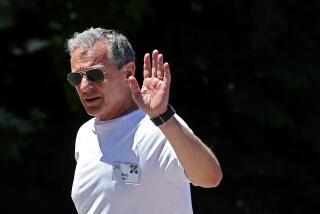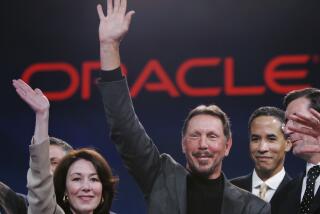Disney Board Presses CEO Hunt
Walt Disney Co.’s board of directors announced Tuesday that it expected to name a successor to Chief Executive Michael Eisner no later than June, setting in motion a wide-ranging search while raising new questions about Eisner’s future in the company.
Board Chairman George J. Mitchell said Eisner, whose contract expires in September 2006, would step down as soon as the new CEO was installed. Exactly how quickly that might occur after his successor is named is unclear.
Regardless, the board indicated that it expected Eisner -- who Tuesday celebrated his 20th anniversary at Disney’s helm -- to remain at the company in some capacity until the end of his contract. It wasn’t immediately certain what that role might be.
Investors have voiced concern that Eisner’s continued presence at Disney could discourage candidates from considering the CEO job.
“No one is going to want to come in as an apprentice for Eisner for a year and a half and wait for their turn in the big office,” said Greg Taxin, chief executive of Glass Lewis, a proxy advisory firm that counsels many Disney shareholders. “It certainly raises questions.”
Still, the board’s action gave at least some investors something to cheer about.
For more than a year, directors have been under pressure from major shareholders to outline their succession plans. Tuesday’s announcement laid out a clear timetable for the search, which will be conducted by an executive headhunting firm that the board has yet to name.
“They gave us a date that our clients in the investment community were looking for,” said Patrick McGurn, senior vice president of Institutional Shareholder Services. “It’s a very positive development.”
Among the possible contenders, the board singled one out for praise: Disney President Robert Iger. The lone inside candidate and Eisner’s top choice, Iger is “highly qualified for the position,” the board said in a statement.
But the board, which has been accused in the past of being a rubber stamp for Eisner, took pains Tuesday to demonstrate its independence. In its statement, it said “the process should include full consideration of external candidates as well.”
Possible replacements for Eisner include News Corp. President Peter Chernin; Yahoo Inc. CEO Terry Semel; Jeff Bewkes, chairman of Time Warner Inc.’s entertainment and networks group; and Leslie Moonves, co-president of Viacom Inc.
According to a source familiar with the board’s thinking, directors felt they had little choice but to act quickly in the wake of Eisner’s announcement less than two weeks ago that he planned to resign.
Among their worries was that Eisner would be viewed as a lame duck. “The starting gun was pushed by Michael,” the source said. The board “had to do something.”
The source added that, out of respect for his long contribution to Disney, Eisner probably would remain on the board until his contract expired.
In a conference call with reporters, Mitchell discounted the possibility that Eisner would keep his board seat after leaving his executive position. Citing news reports, he also suggested that Eisner was not seeking to become chairman after the expiration of his contract.
“Michael has made his statement on that,” Mitchell said, “We take him at his word. As far as the board is concerned, that’s the end of it.”
In fact, in an interview in the upcoming Oct. 4 issue of Fortune magazine, Eisner did not entirely rule out the possibility of his continued service on the board. He said merely that it was his “assumption” that he’d be leaving.
Hollywood executives and headhunters praised Disney’s directors for their swift response to Eisner’s announcement. Management experts had been critical of the prospect of an extended search, concluding that a two-year process could lead to corporate paralysis.
“The board has a fiduciary responsibility to move quickly and expeditiously,” said Bill Simon, an executive recruiter at Korn/Ferry International, a Century City-based headhunting firm.
Simon said high-level CEO searches, such as the one for Eisner’s replacement, “shouldn’t take more than three to six months.”
He speculated that Eisner would almost certainly be forced to step out of any executive or board role once the new CEO was in place.
“No CEO worth his or her salt would accept having Eisner around,” Simon said.
Other management experts agreed. “Eisner is not anxious to shuffle offstage unless he’s pressured or has some incentive,” said Robert Fulmer, a distinguished visiting professor of strategy at Pepperdine University. “If a strong person replaces him, there will be pressure exerted to get him to step off the board.”
Eisner has had a bruising year during which he has been lambasted by investors, former board members and others who accused him of mismanaging the Burbank entertainment company and driving down its value. In March, at Disney’s annual meeting, Eisner suffered a stinging rebuke when investors representing 45% of the voting shares withheld support for his reelection to the board.
Eisner’s resignation announcement was widely seen as an effort to blunt a possible proxy fight by former Disney directors Roy E. Disney and Stanley P. Gold.
On Tuesday, the board did not say how soon it would choose a search firm from among several it was considering. Sources say Korn/Ferry will not be in the running to conduct a search for a new Disney CEO because it has been retained by Roy Disney to find candidates for an opposing slate of directors for the board. Simon declined to comment.
Mitchell, who turns 72 next August, also indicated Tuesday that in compliance with the board’s retirement rule, he did not plan to stand for reelection at Disney’s 2006 annual meeting. He said the board would decide his replacement after identifying a new CEO.
Separately, Disney’s board said its compensation committee revamped its method of determining executive bonuses, tying compensation more closely to performance.
Disney shares gained 28 cents to $23.41 on the New York Stock Exchange before the board made its announcement.
Times staff writer Sallie Hofmeister contributed to this report.
More to Read
Inside the business of entertainment
The Wide Shot brings you news, analysis and insights on everything from streaming wars to production — and what it all means for the future.
You may occasionally receive promotional content from the Los Angeles Times.










